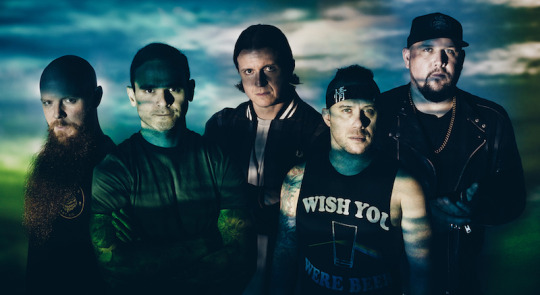
Unless you’re new to the site, you should be well aware of how excited we are for Atreyu’s upcoming tour with Memphis May Fire, Ice Nine Kills and Sleep Signals – we mean, we’ve only written about it like five or six times since it’s been announced.
Not only is The Noise a part of the tour but this will also be the first time we’ll be treated to songs off the band’s brand new seventh full-length album In Our Wake.
No stranger to debate, Atreyu’s new John Feldmann-produced LP has received some criticism from longtime fans for its lack of heaviness as heard on their previous release Long Live. However, for vocalist Alex Varkatzas, the idea of this record being any different from anything they’ve released in their 20-year career is laughable.
“I think it’s an interesting concept of this record being different at all,” he says. “Every Atreyu record has been different from the last. If you look at the difference between The Curse and Death-Grip and then the difference between Death-Grip and Lead Sails and even in Congregation of the Damned, and then if you look at how we changed between Congregation and Long Live and then if you look how we changed for this record, I think that’s just what we are.”
“I think we’ve always kind of thrown curveballs our whole career,” adds drummer/vocalist Brandon Saller. “We’ve definitely taken some crazy turns with style and trying new things and kind of where we’ve taken our music.”
While In Our Wake certainly explores newer territory for the metalcore veterans, that didn’t stop fans from checking out the new album as it topped the Billboard Hard Rock charts in its first week and landed number 15 overall in the Top 200 – surpassing Long Live’s spot at 26.
For some listeners, In Our Wake can be seen as a departure. For others, it’s an opportunity for growth. But for the band, it’s all about pushing their art as far as it can go.
“I feel like we’ve always thrived when we test ourselves and we really push ourselves and do things that are outside of our comfort zone and kind of create a new comfort zone,” says Saller. “I feel like this record is fresh, there’s some kind of turns we’ve made before but there’s a lot of new ground covered as well. And it’s like, you just create this new comfort zone and you kind of expand the parameters of what you can do which is I think is the most important part about being an artist or making music or anything. That’s what it’s about, the expansion of what you’re creating is what the whole thing is about.”
To read more about the band’s thoughts on In Our Wake and check out exclusive photos from Atreyu’s album release party in Scottsdale, Arizona, be sure to check out our in-depth interview with Varkatzas and Saller below. Afterward, make sure to grab tickets to see the band on their 27-date headlining tour here.
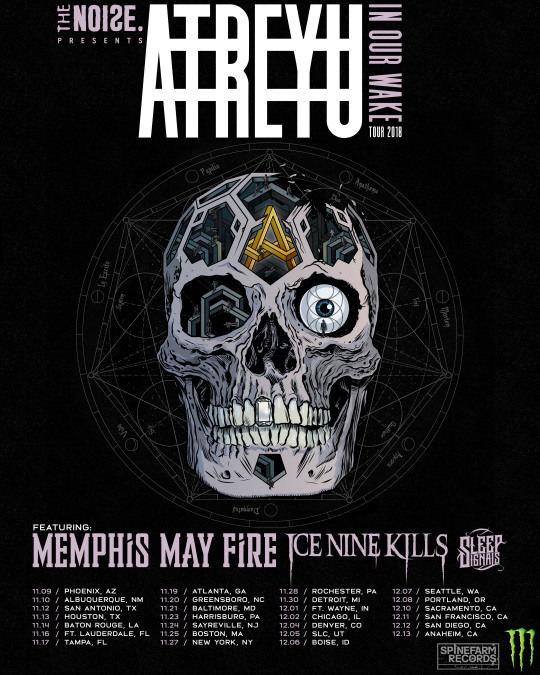
So first and foremost, congrats on the release of In Our Wake. Brandon, were there different nerves leading up to this release being that this record was a bit different for you guys?
Brandon Saller: Um, I don’t think so. I think that we’ve always kind of thrown curveballs our whole career. We’ve definitely taken some crazy turns with style and trying new things and kind of where we’ve taken our music. So I felt like, in the moment, if it feels good while we’re making it in the studio, then that kind of takes away a lot of the nerves for me. I think maybe a little more of the nerves come later when it belongs to the people and they can tell me what they think about it. But I think our fans react well to us taking risks and doing new things because that’s kind of what they’ve come to know of us.
Alex, did you find yourself reading comments when the record came out?
Alex Varkatzas: Uh, a little bit. I’ve kind of gotten away from that. I’m getting a little too old for it to an extent. Maybe if it’s a reputable news source or review or something like that, I might check it out just because I’m interested. But as far as what some random person thinks on YouTube about our video who may have just trolled by, you know, I don’t really care. I don’t make music for that. I think it’s also an interesting concept of this record being different at all. Every Atreyu record has been different from the last and we started doing real big departures – if you look at the difference between The Curse and Death-Grip, and then the difference between Death-Grip and Lead Sails, and even in Congregation of the Damned. And then if you look at how we changed between Congregation and Long Live, and then if you look how we changed for this record, it’s like, I think that’s just what we are. If we had written a 20 song album, maybe it might not seem as different. But we wrote 20 songs and whittled it down to these 12 because these are the 12 that we’re excited about and most interested in right now. But it’s always interesting to me when people say that it’s like, “Oh, this is a departure. This has changed.”
BS: It’s always a departure [laughs].
AV: So it’s always different. You know, this is a bigger departure than the difference between Death-Grip and Lead Sails? I don’t know. Lead Sails is our biggest album that really put us in front of a lot of audiences. So yeah, I don’t feel nervous like that. I feel nervous for every record. You know what I mean? Every time it’s like showing your dick to somebody.
BS: It’s always scary at first.
AV: It’s like showing your dick to anybody, male or female. You know, you want them to like it.
BS: I think the common thing too, if somebody leaves a shit comment on any of our stuff, it’s like, “Well, we obviously don’t write music for you.” That’s okay. Some people don’t like Indian food. I love it.
Leading up to this record, did you guys know ahead of time where you wanted to go with it? With Long Live being heavier, did you know you wanted this to be maybe more “accessible”?
AV: I don’t think so. I wouldn’t use the word “accessible” but I think Long Live was – we wrote it compartmentalized not separate from each other but very like, “this is this part, this is this part. What do you think? Okay, it changes here. Okay, this is a song.” And Long Live was also in a box. We wanted to make an aggressive record. I didn’t want to sing on that record. I still don’t. If I could go back and make Long Live again, I wouldn’t [sing]. I wouldn’t be like, “Well, I’m gonna sing this part.” That wasn’t the point. The point was, that record was this piece of art. It was focused this way and meant to be this way. And for us and for me, especially me, we hadn’t made music in years, you know what I mean?
BS: I think that’s why it sounds like that, you know? We hadn’t been Atreyu for almost four years. We hadn’t made music together. We hadn’t played Atreyu shows. So that [feeling] came back and it was just like, “get in the pit, punch people in the face, headbang, sweat, yell, scream, bleed.” That was the music we wanted to make. That’s what just came out. You know, because I think that’s what the energy was at the time.
AV: And for [In Our Wake], we wanted to make a big boy record. Not that [Long Live] wasn’t a big boy record. But that wasn’t like – that didn’t take anything for me mentally. I didn’t feel challenged in doing that and I don’t think our fans did. Our fans felt like, “Oh, this feels safe and easy.” And that’s cool. But it’s like, where are we going to go with that at the end of the day of making music that’s not like, “I don’t know how this makes me feel, I want to see where this goes.” I’m going to try something new and different. You know, I think that’s when you get the best results as an “artist.” I think it’s most gratifying.
Do you agree, Brandon?
BS: 100%. I feel like we’ve always thrived when we test ourselves and we really push ourselves and do things that are outside of our comfort zone and kind of create a new comfort zone. I feel like this record is fresh, there’s some kind of turns we’ve made before but there’s a lot of new ground covered as well. And it’s like, you just create this new comfort zone and you kind of expand the parameters of what you can do which is I think is the most important part about being an artist or making music or anything. That’s what it’s about, the expansion of what you’re creating is what the whole thing is about.
AV: I feel like Long Live is like a freefall. After you’re freefalling, if you just freefall forever – like if that was a ride at Disneyland [where] you get in line and you could go and you could freefall forever – after a while, it would lose something. You would just be fucking falling and after an hour of falling, you wouldn’t even know that you were falling anymore. [In Our Wake] is like a roller coaster. It picks up, it speeds up, it slows down, it drops out, it changes and I think that’s more interesting for me as an artist and I think for a listener too. After a while, you’ve already heard a record that sounds like The Curse, you’ve already heard Suicide Notes, you’ve already heard Death-Grip. You’ve already heard these records and [you can] go back and listen to them, we didn’t erase them. They still exist, don’t be scared. [In Our Wake] is this record now. And we might want to make a fucking black metal record our next album just because. If we want to do that, we will and I think that’s the fun part about making music.
BS: I think the really interesting part about our fans too, like I was saying, they’ve come to expect this from us. So many people, even just people commenting on their favorite songs and this and that, I’ve seen so many people commenting that “Terrified” and “Superhero” are their favorite songs on the record. Those are the two hard left – “Terrified” is a guitar solo away from being a pop song. And I love that because we are characteristically a metal band and we wrote a great pop song that still sounds like our band somehow. “Superhero” sounds like, you know, ELO on crack with a metal guitar solo. And our fans are like, “I love that.”
AV: If I were to ask you what ELO was officially, would you be able to tell me?
BS: Electric Light Orchestra
AV: Okay, makes sense. Go on [laughs]
So would you say the creative risks have paid off? You guys got the responses you were expecting?
BS: I’d say 500%.
AV: Yeah, exactly what we thought people would say about this record they’re saying and it’s been great.
BS: I mean, like I said too, it’s like this: If you get all love on your record, then you did something wrong. Like people need to hate your shit. There’s gotta be some people that think we are the most garbage band on earth. Otherwise, we’re fucking boring and we shouldn’t be here. So it’s like, our fans fucking love this album and I think it’s surprising a lot of new people too. So I feel like this is everything that I’ve wanted it to be and more so far.
So talking about singing vs screaming on In Our Wake vs Long Live. Alex, when did you know you wanted to sing on this record?
AV: Literally, before every song it was like, “Yeah, that’s the vibe for this song.” Because if you listen to all those songs, it’s not like, “Oh, this is my new voice.” Like how I sound in the verses of “In Our Wake” sounds pretty different from how the verses do on “Time Is Now.” You know what I mean? Which is completely different from “Anger Left Behind” which is completely different from – why do I want to keep calling it “Human Hurricane”?
BS: “Nothing Will Ever Change.”
AV: Yeah, completely different.
BS: Still working with working titles.
AV: Every single song, it’s different for me and that’s what I wanted. Like my favorite vocalist right now is the dude from Skindred. That dude is all over the place with the stuff he does. It’s not just one sound.
BS: It’s signature, it sounds like him.
AV: And that’s what I want to do. I don’t really think I jock anybody or try to sound like anybody. I just sound like me. And in each song, it was like, “What do I sound like in this?” It’s like playing a character almost. I kind of get in my head like, “What is the character for this song? Yeah, that’s what this kind of character sounds like.”
Interesting. So speaking of characters, on this record Alex, you rap a little on “Blind Deaf & Dumb” and…
AV: Dude. I think it’s, you know… Okay. I’ll let you finish.
BS: [Laughs]
AV: I want to get back to that.
[laughs] Well, we were going to say, Brandon, did you know Alex had that in him?
BS: The bars?
Yeah! The bars.
BS: You know, he’s always been a fucking legend with lyrics. And he’s always had like, an insane rhythmic style to singing. Like, we had one show where Alex had to go home and we had people fill in for him. And they were like, “I don’t understand how he does this. This is so many words. I can’t breathe.” It’s challenging what he does.
AV: It’s all [backing] tracks [laughs].
BS: [Laughs] Yeah. But this was cool because “Blind, Deaf & Dumb” is a very like, bouncy, rhythm-based song. So [Alex’s “rapping”] just came out there, but it was fucking awesome. I wouldn’t call it a “rap” but it’s more rhythmic than usual.
AV: Yeah, but if you look at hardcore and if you know anything about hardcore and like, listen, to hardcore, what does Madball sound like if you pulled out all the music?
BS: Hip-Hop.
AV: Like, what is Freddy’s verse and the way he spits? It sounds like he’s fucking spitting – and it’s respect, I love Madball. And then if you listen to like, Freddy has a rap or hip-hop album, and if you put hardcore guitars behind it, it would just sound like [Madball]. If you listen to a lot of old hardcore, it has that, or like Agnostic Front, like any of that in a way – the meter they are doing their thing, it sounds like that to me. And I think a lot of people don’t realize that the connection is there. And then if you look at bands like Beastie Boys – you know, which is totally lost on like anybody under 20 or 25 – they were a hardcore punk band…
BS: Who did hip-hop vocals…
AV: Yeah, and in the end, it just turned into that. So I think like, for me, that’s what I’m channeling. When I think of that, that’s what I’m thinking about like Beastie Boys and just kind of like, a different rhythm or even more like hardcore. To me, that’s just what it sounds like, the way that I’m doing that. You can take it however which way you want. If people think it’s rap, that’s cool. I don’t listen to too much rap, so I don’t know. I can’t tell you. I only listened to the Eminem song and the one where the other dude fires back at him and then Eminem back at him [laughs]. Those are the three rap songs I’ve listened to this year. All three were great.
BS: It’s funny how you receive it because, in my head, that song reads very heavily like Faith No More. Like the vocals, that’s very reminiscent of Mike Patton, very rhythmic.
AV: But I’m not trying to bitch out and distance myself from rap or anything like that. I don’t care.
BS: Yeah, the rap album is coming out in 2020. We’re actually a rap duo [laughs].
AV: I am gonna get a couple face tattoos later today. [laughs]
Yeah! What’s going to be your emcee name?
BS: Lil’ L?
AV: Young Lil’ L. Young Lil’ Ec.
BS: Lil’ Ec. Lil’ Ec is good.
AV: Yeah, Lil Ec.
Brandon, when it came to putting this record together, how quickly did you guys know you wanted to work with John Feldmann?
BS: Before we even started writing. It’s funny because we went on this Long Live cycle and it was the first time kind of engaging with our fans and really hearing what they want from us and seeing the energy live for certain songs. It was very – I mean, obviously, we know Lead Sails was a very big record for us, our biggest, but feeling the energy from those songs was like, “Holy shit, people really connect to this!” And it made us really revisit the record and kind of be like, “Holy shit, this is a fucking next level record and we’re super proud of that.” So I remember, we were at the APMAs and I was in the hallway with Feldmann and we’re just randomly talking. And I was like, “Let’s make another record.” And his eyes lit up. And you never know because he’s gone so far from when we made a record 10 years ago. He’s moved on to, you know, he was making tons of humongous rock records and some pop stuff. But he’s moved on to gigantic pop artists and really big things. So it’s like, you never know if he’s going to be like, “I can do it still” if that’s still what he wants to make, a metal record. And so his eyes kind of lit up and it was like, “this is awesome.” So we just kind of had talks from there. And as soon as he was down, that’s when we literally started making the record. Because we made it in two parts, the first half was in this last summer and then the rest of it was at the end of the year, like November, December. So it was kind of us in our head where we were like, “[if we could combine] what we’ve learned over the last 10 years and what we’ve lived through with what John’s learned over the last 10 years and if we could do what we did back then, then what can we accomplish now as a team?” So I think it shows that we could accomplish something awesome.
Alex, what do you think was the biggest difference working with Feldmann then vs now?
AV: I think we were able to take what we learned from him the first time and use it the second time. I think the first time we were caught in the river of the process. And then this record, we actually got to play more of a part in the process – not that we didn’t last time at all, that sounds weird. But [back then] it was like, “Okay, this is what’s going on. Okay, this is what I do. Okay. It’s all new.” And now, we had a record or two on our own to kind of employ what we’ve learned from John as well. And then to come back and get John’s newest version of what John is doing, we were able to transition into it instantly and understand what he’s saying. We had a pretty good workload for the record. We did it over two chunks, each was only a couple weeks each. And we would do two to three fresh songs a day, we had no demos. Normally we do demos – it wasn’t us being lazy, we just didn’t do that. Like we went in and wrote new music every single day and it’s like working out or something, it gets you goin’.
You would agree, Brandon?
BS: Yeah, exactly what Alex said. I mean, the first time you work with someone, especially someone like John who is very high energy and whirlwind-type of experience where you’re just like, “Holy shit.” It’s like you’re jumping into like a fucking speeding river. It’s like, “aaand… we’re going” and you just take the fucking ride and before you know it, the record’s done. And I love that energy, I love the kind of on-your-toes feeling it makes you feel and it forces you to be as creative as you possibly can because it’s like, “What do you got? What do you got? What you got? Cool, we’re doing drums now. Cool, guitar.” Like it’s all over the place and it was cool because we knew what that energy was this time going in. So it wasn’t like we were jumping off a speeding train, you know?
AV: We jumped on to it and we hit the ground running. We were able to contribute a lot more quickly to the process.
So let’s talk about your guy’s headlining tour. You’ll be going out with a few Warped Tour-friendly bands in Memphis May Fire and Ice Nine Kills as well as Sleep Signals. What were your thoughts on putting together the tour package? Did you know you wanted to lean more “Warped” than say, “Octane”?
BS: We didn’t focus on specific genres. We just wanted current bands that had their own thing going on and that had something new and fresh to offer. Every band on this tour has a new album that just came out or will be coming out on our tour. So it’s like, we have a new album, Memphis May Fire has a new album, Ice Nine Kills has a new album and Sleep Signals, I think, is doing an EP. Everyone has something fresh and new to add to the tour. So I think that’s cool. I’ve met a couple of the Memphis May Fire dudes over the years and they’ve always been a cool band and they had their own thing and I’m always kind of watching from afar. Same with Ice Nine Kills. We did Warped with them a few years back and they just did Warped again and fucking murdered it. So it was like, “that’s a cool band that is really doing their own signature thing and yeah I want them to be a part of our tour as well.”
Would you agree Alex that with all the tours you guys have done over the years, it’s important to bring something different for your fans to see?
AV: Yeah, man. We want to do something fun and exciting. And I think all these bands fit together well too. There aren’t any, like, really abrasive curveballs one way or the other. It’ll be a really good show.
So the last thing to discuss is your track “Superhero.” You guys have some guests features on that with M. Shadows and Aaron Gillespie. How did the song come together? And is it everything you wanted it to be?
BS: It is absolutely everything I wanted it to be. I think that’s why it literally took from the beginning of the making the record session to the very end to complete it. It was very step-by-step. We had originally eight minutes and then we cut it down to like, six and a half.
AV: We were losing dudes at eight minutes. I was off that song at eight minutes. If we had kept it at eight minutes, I think there would have been a band battle and it never would have happened. So it was rad we kept it at six.
BS: Yeah, for sure. We got the arrangement right and then the concept came, then we had a chorus and then we had Alex’s verse. Then it was getting other people involved in the concept, getting other fathers involved and step-by-step that started piecing together. And then it was all the other instrumentation and all the orchestrated stuff at the very end came in. It was a lot of work to get that song where it was but that was a part of the record that I was gripping tight to and I wouldn’t let go because there were a couple times where [bandmates were like], “I don’t understand what’s happening here.” And I was like, “Just trust me, it’s going to be cool at the end.” And it turned out fucking awesome. I think it’s one of those moments, as an album ender, there’s nothing that could come after that song.
Alex, was it pretty emotional to work on this song with it being about fatherhood and looking after your kids?
AV: Yeah, I mean, that’s the part where I should say yes but I think everything I do, I I just go all into it. I don’t want to do something for nothing anymore. So with this song, just like a song about racism and stupidity in the US or a tarnished friendship, I’m going to put my heart into everything. But it’s a lot easier to put your heart into something [about] your kids.
BS: That came up a couple times on this record. We have a few songs that are leaning towards that.
AV: But at the heart of it though, they’re love songs. And I think the important takeaway is that we’ve focused the laser in our mind that it’s about our children but I think the songs are just good love songs. If you listen to the words and what it’s about, like for instance “House Of Gold” is another song with a similar vibe, it’s about building a safe positive place with love and that could be for your mom or that could be for your significant other. And I think a lot of this record is about love, not necessarily a popular topic in metal, but that’s what it’s all about. The good things in this life are based around love. And I think these songs for us, because of where we’re at, we feel a lot of love for our children and our families right now. But I think a lot of people, even if you don’t have kids, you can get on the vibe whether it’s about your dog or your mom or something that you feel passionate about. I think they’re just really passionate songs and they’re some of our most honest lyrics and it comes across even more, well, passionate – which I guess is the word I’m going to go back to like butter cake.
BS: [Laughs]
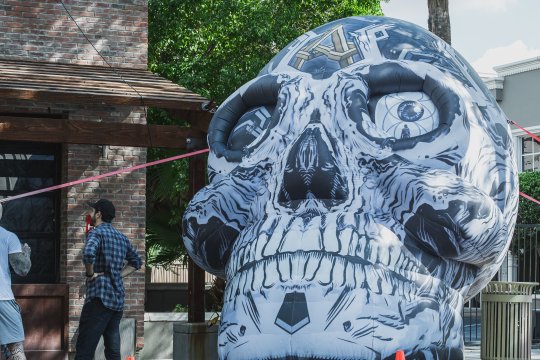
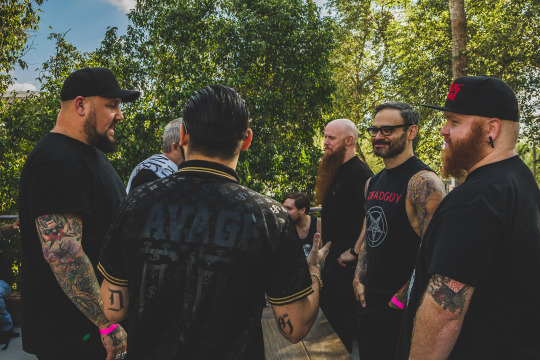
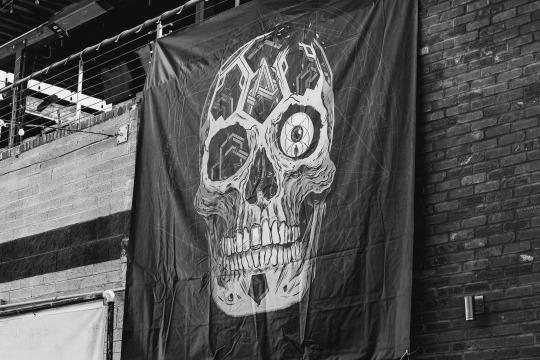
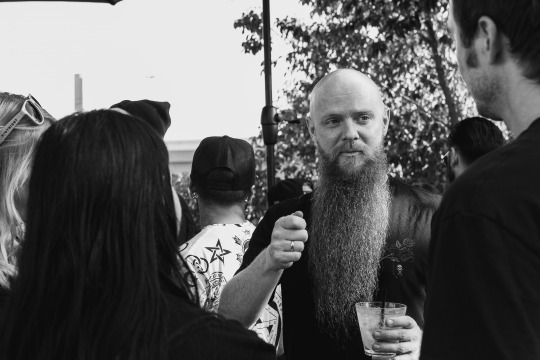
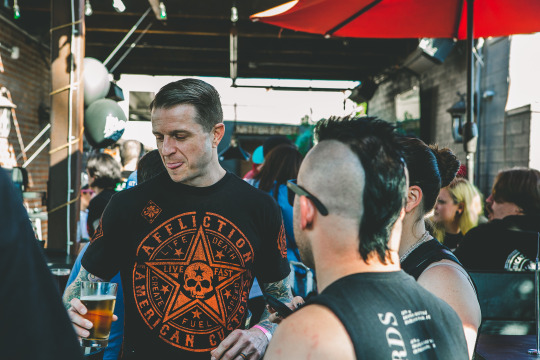
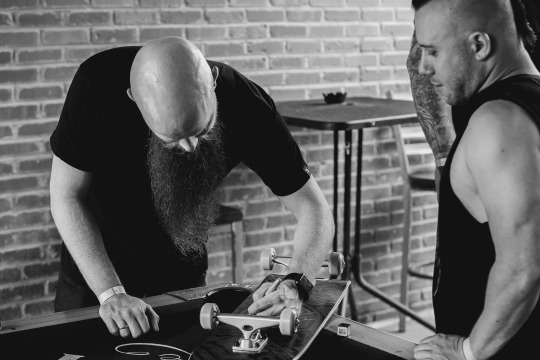
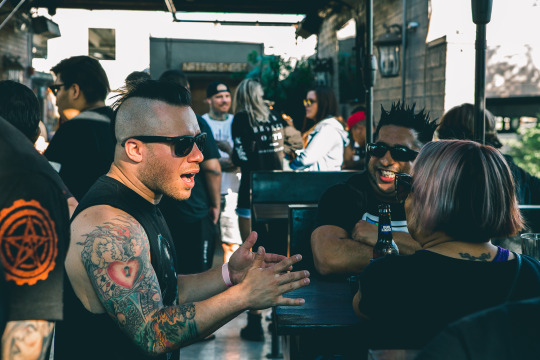
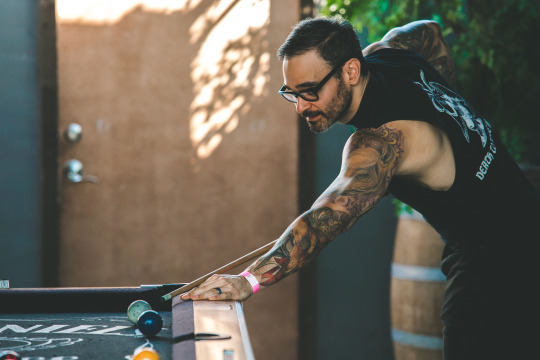
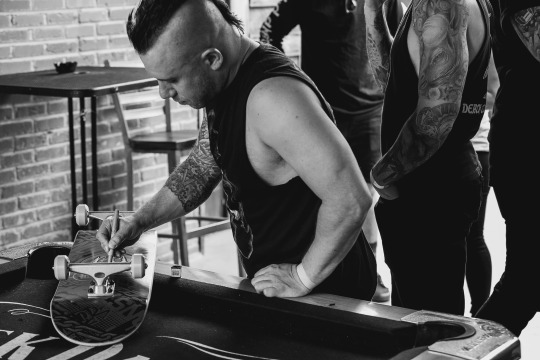
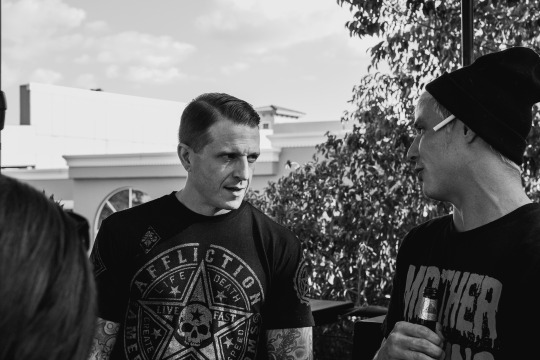
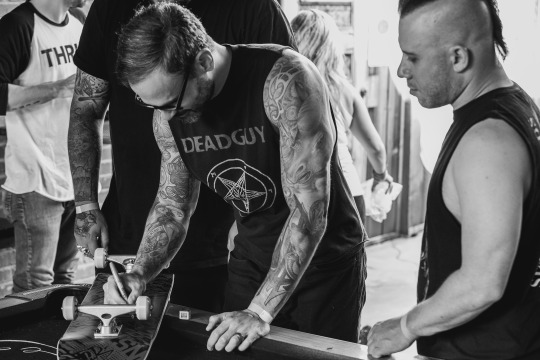
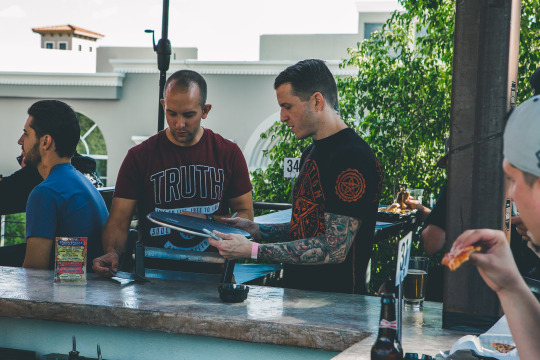
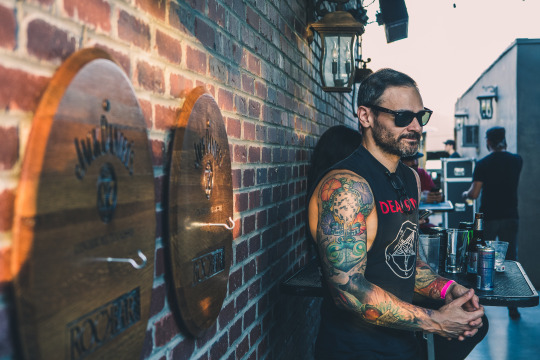
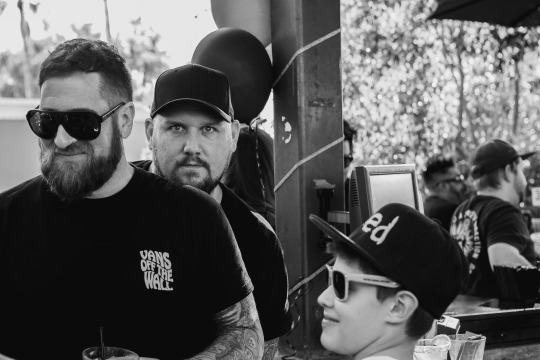
All photos by Julius Aguilar


_1617392339.jpg)




